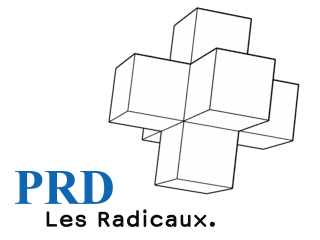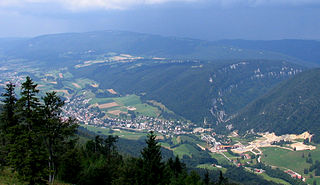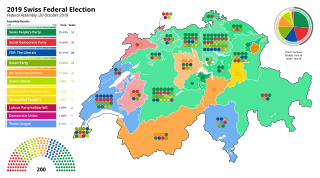
Bern, or Berne, is the de facto capital of Switzerland, referred to as the "federal city". With a population of about 146,000, Bern is the fifth-most populous city in Switzerland, behind Zürich, Geneva, Basel and Lausanne. The Bern agglomeration, which includes 36 municipalities, had a population of 406,900 in 2014. The metropolitan area had a population of 660,000 in 2000.

The 26 cantons of Switzerland are the member states of the Swiss Confederation. The nucleus of the Swiss Confederacy in the form of the first three confederate allies used to be referred to as the Waldstätte. Two important periods in the development of the Old Swiss Confederacy are summarized by the terms Acht Orte and Dreizehn Orte.

The Social Democratic Party of Switzerland, also called the Swiss Socialist Party, is a political party in Switzerland. The SP has had two representatives on the Federal Council since 1960 and received the second-highest number of votes in the 2023 Swiss federal election.

The National Council is the lower house of the Federal Assembly of Switzerland, with the upper house being the Council of States. Containing 200 seats, the National Council is the larger of the two houses.

The Council of States is the upper house of the Federal Assembly of Switzerland, and the lower house being the National Council. It comprises 46 members.

The Free Democratic Party, also called Radical Democratic Party was a liberal political party in Switzerland. Formerly one of the major parties in Switzerland, on 1 January 2009 it merged with the Liberal Party of Switzerland to form FDP. The Liberals.
Switzerland elects on national level a collective head of state, the Federal Council, and a legislature, the Federal Assembly.

The Federal Assembly, also known as the Swiss Parliament, is the federal bicameral parliament of Switzerland. It comprises the 200-seat National Council and the 46-seat Council of States. It meets in Bern in the Federal Palace.

Bernese Jura is the name for the French-speaking area of the Swiss canton of Bern, and from 2010 one of ten administrative divisions of the canton.
Voting in Switzerland is the process by which Swiss citizens make decisions about governance and elect officials. The history of voting rights in Switzerland mirrors the complexity of the nation itself. The polling stations are opened on Saturdays and Sunday mornings but most people vote by post in advance. At noon on Sunday, voting ends and the results are usually known during the afternoon.
The Executive Council is the executive of the Swiss canton of Bern.
The Green Liberal Party of Switzerland, is a green-liberal political party in Switzerland. Founded in 2007, the party holds eleven seats in the Federal Assembly as of the October 2023 election.

The Grand Council of Neuchâtel is the legislature of the canton of Neuchâtel, in Switzerland. Neuchâtel, styled as a Republic and Canton, has a unicameral legislature. The Grand Council has 100 seats, with members elected every four years.

The Cantonal Council of Zürich is the legislature of the canton of Zürich, in Switzerland. Zürich has a unicameral legislature. The Cantonal Council has 180 seats, with members elected every four years.

Federal elections were held in Switzerland on 18 October 2015 for the National Council and the first round of elections to the Council of States, with runoff elections to the Council of States being held in various cantons until 22 November.

Federal elections were held in Switzerland on 20 October 2019 to elect all members of both houses of the Federal Assembly. This was followed by the 2019 election to the Swiss Federal Council, the federal executive, by the United Federal Assembly.
There are 26 constituencies in Switzerland – one for each of the 26 cantons of Switzerland – for the election of the National Council and the Council of States.

Federal elections were held in Switzerland on 22 October 2023 to elect all members of the National Council and Council of States. The elections were followed by elections to the Federal Council, Switzerland's government and collegial presidency, on 13 December.

By-elections to the Swiss Federal Council were held on 7 December 2022, after federal councillors Ueli Maurer (SVP-ZH) and Simonetta Sommaruga (SP-BE) announced they would leave the Council effective 31 December of the same year. The parliament elected Albert Rösti and Élisabeth Baume-Schneider respectively to replace them.
















